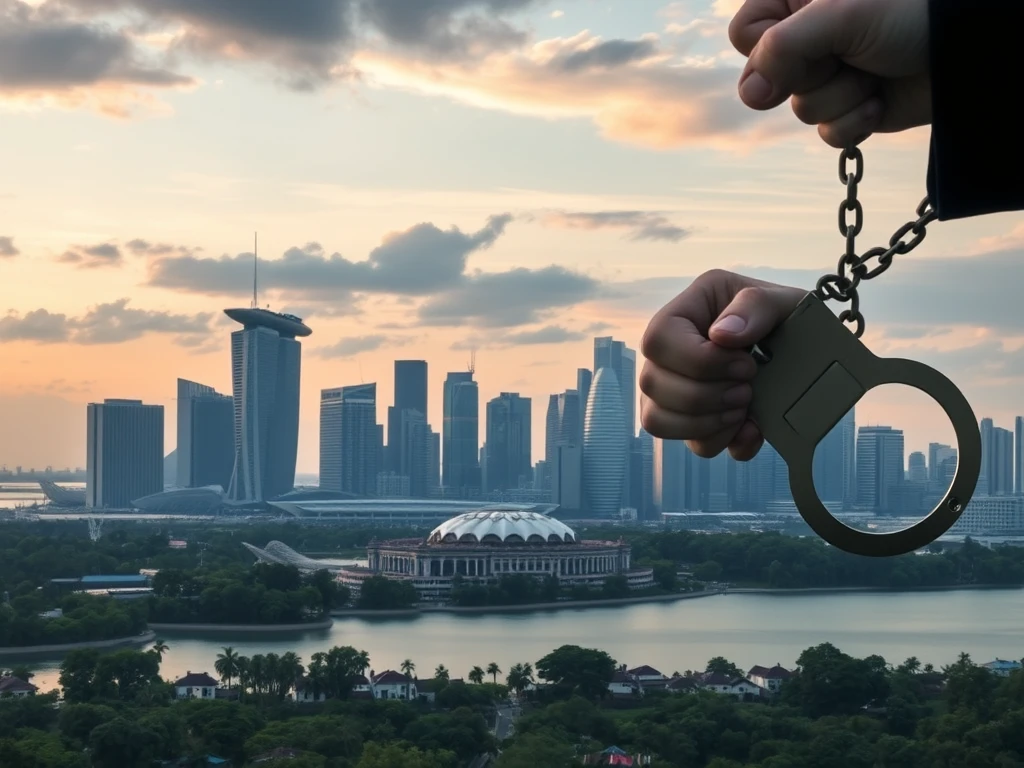URGENT: Singapore Crypto Regulations Bring $200K Fines and Jail Risk

Are you a crypto business operating out of Singapore or serving clients there? If so, listen up. Singapore’s new crypto regulations have just dropped, and they come with serious consequences for non-compliance. We’re talking potential fines of up to $200,000 and even jail time. The deadline is fast approaching, and there are no second chances.
Singapore Crypto Regulations: The June 30 Deadline
The Monetary Authority of Singapore (MAS) has issued a clear directive. By June 30, 2025, any entity based in Singapore offering digital token services to overseas clients must either secure a DTSP license or immediately cease cross-border operations. This isn’t a suggestion; it’s a mandate.
- **Who is affected?** Any Singapore-incorporated entity (company, partnership, individual) providing digital token services to clients outside Singapore.
- **What are the options?** Obtain a Digital Token Service Provider (DTSP) licence under the Financial Services and Markets (FSM) Act 2022, OR immediately stop serving foreign markets.
- **Is there a grace period?** No. MAS has explicitly stated there are no transitional arrangements or extensions. Compliance must be met by the deadline.
This move aims to close a regulatory gap, preventing Singapore-based firms from serving global users without meeting strict compliance standards.
Who Needs a DTSP License Under the New Rules?
The definition of a Digital Token Service Provider (DTSP) under Section 137 of the FSM Act is broad. It covers a wide range of activities:
- Transferring digital payment tokens.
- Exchanging digital tokens for fiat or other tokens.
- Holding tokens in custody for others.
- Promoting any token-related service.
This definition includes centralized exchanges, DeFi platforms, wallet providers, token issuers, and even non-crypto firms promoting foreign crypto projects. The key factor is being incorporated in Singapore and serving overseas clients, regardless of the scale of business or direct handling of user funds. MAS emphasizes that business model or revenue size does not exempt entities from needing a DTSP license if they fall under this scope.
MAS Crypto Stance: No Extensions, High Bar
Despite industry requests for a phased approach or transition window, MAS has refused. The regulator cited risks related to financial crime as the reason for the abrupt timeline. This means firms face a compliance cliff: either get licensed or exit the overseas market by June 30.
Furthermore, obtaining the MAS crypto license is proving exceptionally difficult. While not an official ban, MAS announced in June 2025 that licenses would be issued only in “extremely limited circumstances” due to ongoing Anti–Money Laundering (AML) and Counter–Terrorism Financing (CFT) concerns. This effectively creates a de facto licensing ban for most applicants. The bar for approval is very high, requiring elite compliance infrastructure and strong operational justification.
Breaking Rules: Facing Crypto Fines and Jail
Operating as a DTSP for overseas clients without a valid license after June 30 is a criminal offense. Violators of Section 137 of the FSM Act face severe penalties:
- Fines up to SGD 250,000 (around USD 200,000).
- Imprisonment for up to three years.
MAS intends to apply these penalties regardless of the business size or violation scope. This elevates compliance from a business decision to a legal imperative. Firms must be fully licensed or cease relevant activities to avoid these serious consequences.
Why the MAS Crypto Compliance Clampdown?
Singapore’s strict stance on crypto compliance stems from a desire to protect its reputation as a trusted financial hub. MAS wants to prevent regulatory arbitrage, where firms register in Singapore for legitimacy but serve clients elsewhere under laxer rules. The FSM Act’s Section 137 gives MAS direct oversight over cross-border digital token activity, ensuring that firms operating from Singapore meet high standards, regardless of where their users are located.
Broader Implications: The Crypto Exodus
This policy shift is already causing significant changes. Some firms, like WazirX, have relocated operations out of Singapore to jurisdictions seen as more permissive. Other industry players are restructuring or withdrawing teams. This trend, sometimes called a “crypto exodus,” sees companies moving to places like Panama, Hong Kong, or Dubai in search of more flexible regulatory environments. Meanwhile, other countries in the region are exploring different approaches to crypto, highlighting the varied global regulatory landscape.
Conclusion
Singapore’s new crypto regulations represent a significant tightening of controls for firms serving overseas clients. The June 30, 2025 deadline for obtaining a DTSP license or ceasing operations is firm, with no extensions. The potential penalties, including substantial crypto fines and jail time, are severe. With MAS adopting a very restrictive approach to issuing new licenses, many firms face tough decisions: invest heavily in compliance infrastructure, find a buyer, or relocate. The era of leveraging Singapore’s reputation while operating under less stringent rules abroad is over. Compliance is now non-negotiable.







